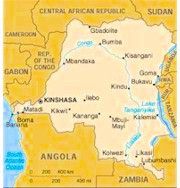Seeking peace in a land of war
One on One with the UN Ambassador from The
Democratic Republic of the Congo, Ileka Atoki
 Despite
a ceasefire in the Democratic Republic of the Congo (DRC) that has
held for the last six months, the situation in one of the world�s
richest nations remains "fragile," a United Nations envoy recently
told the press. "We went [forward] a great deal compared with the
situation at this time last year," Kamel Morjane, special
representative of the Secretary-General Kofi Annan told reporters.
The main problem is in the east, where there is still fighting
between government and rebel forces, the envoy reported. Despite
a ceasefire in the Democratic Republic of the Congo (DRC) that has
held for the last six months, the situation in one of the world�s
richest nations remains "fragile," a United Nations envoy recently
told the press. "We went [forward] a great deal compared with the
situation at this time last year," Kamel Morjane, special
representative of the Secretary-General Kofi Annan told reporters.
The main problem is in the east, where there is still fighting
between government and rebel forces, the envoy reported.
Democratic Republic of the Congo ambassador Ileka Atoki recently
addressed a gathering of activists and concerned members of the
Diaspora, at Sista�s Place in Brooklyn, New York, headquarters of
the December 12th Movement. He came to explain that the Congolese
people did not start the war and only want peace. The war started,
he said, in December 1998 when Uganda and Rwanda sent army forces
into the DRC, claiming that they wanted to protect their borders.
The Congolese government has charged that the real reason was to
plunder the nation�s rich natural resources, a claim that has been
supported by the UN Security Council in various reports. At one
time, there were five nations fighting in the DRC�Zimbabwe and
Angola on the side of the Congolese. Rwanda, Uganda and Burundi on
the other. The past few months have shown movement towards
de-militarization, which has been closely monitored by the United
Nations. Ambassador Atoki sat down for a few minutes with Final Call
staff writer Saeed Shabazz to talk about what is happening in the
DRC.
Final Call News (FCN): What is ahead for the DRC? Are things
improving?
Ileka Atoki (IA): Things are changing, but very slowly. We
can say that the peace process is moving forward. The stumbling
point seems to be between our government and the government of
Rwanda, which I believe is a matter of confidence that a ceasefire
is in the best interest of the Rwandans. We are now dealing with
disarming the soldiers and that is presenting many logistical
issues. There are also belligerents in the north, who are refusing
to lay down their arms, so we have to spend time in dialogue with
them. But I expect that we will see some movement on all of these
problems in a few weeks.
Our biggest problem right now is the issue of disarming. Since we
signed the Lusaka Accord in 1999, new groups have emerged. These
groups are not mentioned in the agreement, but they are forces that
must be reckoned with. The other problem is, should we disarm
Congolese people who are fighting against the occupation of our
country? We will spend the next few weeks working on this issue.
FCN: The Organization of African Unity (OAU) just a few days ago
told the General Assembly that attention must be paid to the
proliferation of small arms on the continent. What help can you
expect from the international community in disarming the people in
the DRC?
IA: We have asked the international community to help us in
the DRC and their response has been that the international community
cannot get involved in disarming people. We are left to understand
that disarming must be accomplished on the national and regional
level. What we want to do is achieve peace as soon as possible and
then see what we can do in getting guns out of the people�s hands.
What is ironic is that we do not manufacture weapons, the one�s
producing them are the European countries and they should do
something about the problem.
FCN: How important is the newly formed African Union to the
future of Africa and the future of the DRC?
IA: It is very important that we have some kind of national
body, such as the European Union to be a force to be reckoned with
in the world. In my view, it will take a couple of years to put in
place the many things discussed at (the OAU summit in) Lusaka
(Zambia), but we are moving in the right direction. We are very
united, even if you see some differences it is normal, like in a
family between brothers. We still overcome our differences, and now,
even at the UN, we are speaking very often as one African voice.
FC: What do you want the people in the Diaspora to understand
about the conflict in the DRC?
IA: The international community is only interested in
preserving their interests in the region. Actually, the fight that
we have is not something the Congolese started. It is really a fight
between superpowers and they are using some of our brothers to
achieve their goals, and that is the unfortunate thing.
FCN: Thank you. |

![]()